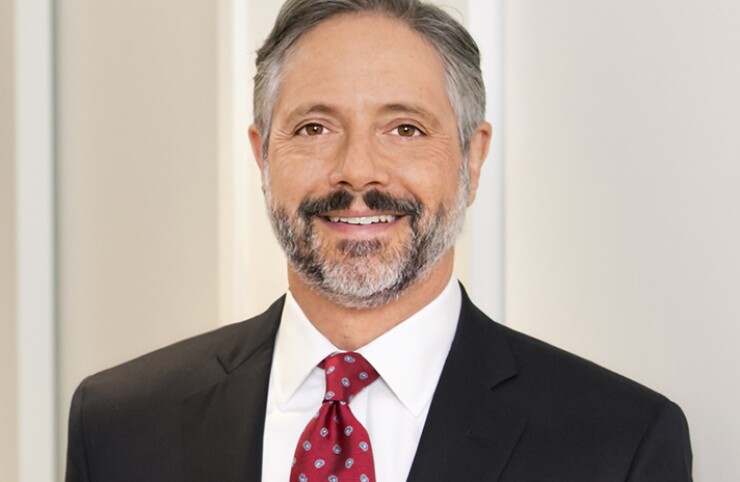Municipal bonds are directly or indirectly involved in a flurry of litigation in Arizona, Oklahoma, Texas, and Utah triggered by defaults, bankruptcy, environmental concerns, or laws that punish financial firms for their stance on fossil fuels.
The outcomes of the lawsuits could determine if bonds can be issued, who is to blame for defaulted debt, and if state municipal underwriter bans are constitutional.
In Texas, state Comptroller Glenn Hegar and Attorney General Ken Paxton have a Friday deadline to respond
The case, brought by the American Sustainable Business Council in federal court in Austin, claims the law violates free speech and association rights protected under the First and Fourteenth Amendments of the U.S. Constitution.
The law, and another aimed at companies that “discriminate” against the firearm industry, have led to the blacklisting of 19 financial firms, including muni bond underwriters, for purposes of state and local government contracts and divestment of public pension and other assets.
The free speech lawsuit comes after the U.S. Supreme Court last year
The
In the wake of that ruling, the challenge against the Texas law becomes a “more interesting test case” because it involves an industry and actual economic benefits, according to Neal Pandozzi, partner at law firm Bowditch & Dewey.
”I think the decision is going to depend on whether there is a critical mass of legislative intent in Texas that shows that the motivation behind this particular anti-boycott law affecting fossil fuels was to regulate commercial conduct,” he said. “If they’re able to do that, then I think this survives scrutiny.”
Enforcement of a similar law in Oklahoma was
The state Supreme Court issued a procedural ruling in the case on Monday.
Oklahoma Treasurer Todd Russ has placed seven companies, including bond underwriters Barclays, Bank of America, JP Morgan, and Wells Fargo, on a list of fossil fuel “boycotters.”
In Arizona, a second lawsuit was filed against key participants in the bond financing of a participant sports venue in Mesa that resulted in defaults and bankruptcy.
Municipal bond funds from Vanguard, AllianceBernstein, and Voyageur sued bond underwriter B.C. Ziegler, bond counsel Gust Rosenfeld, and others
The litigation was spurred by the fallout from Legacy Cares’ May 2023
“Unbeknownst to plaintiffs, the project was doomed from the start as the bond offerings were based on provably false projections of the sports complex’s potential revenues and costs, the risk associated with the project, and the project’s ability to service the debt,” the complaint stated, adding it was incumbent on the underwriter and bond counsel to conduct due diligence.
A statement from Ziegler said it “does not believe the allegations that have been made against it in the lawsuit have any merit and intends to vigorously defend itself.”
Gust Rosenfeld denies the allegations and will vigorously defend the lawsuit, according to Charles Wirken, the law firm’s general counsel.
Ziegler and Gust Rosenfeld are also defendants in a
The
Motions to dismiss the initial case were rejected by a judge, who last week set oral arguments for November.
Each lawsuit seeks all payments on the bonds, as well as more than $1 million in damages. A federal bankruptcy judge confirmed a liquidation plan for Legacy Cares in June.
In Utah, environmental concerns have spurred lawsuits brought by the Center for Biological Diversity and others against a proposed bond-financed crude oil-transporting railway and the bond-issuing Utah Inland Port Authority.
Deeda Seed, the center’s senior Utah campaigner, said environmental and financial concerns are merging.
”It’s because these financial tools are being used to create substantial public harm that has an impact on human health and ecosystem health, which are intertwined,” she said. “We’re facing an existential threat in Utah with the crisis of our drying Great Salt Lake, and in the fact that the water resources that we have available are finite, and so how we grow and develop is really, really important.”
Litigation filed in Salt Lake County District Court in September
The lawsuit claims the authority “unconstitutionally” formed 10 project areas that jeopardize ecosystems, property values, and public health, safety and recreation.
The Tooele Valley Public Infrastructure District,
Following a public hearing last week on the tax differential bonds, the center and Utah Physicians for a Healthy Environment advised the district the bond process must be restarted under state law to give the public an opportunity to review “critical financial documents” and other information that has not been disclosed.
The district declined to comment, according to its attorney.
The U.S. Supreme Court
The Seven County Infrastructure Coalition, a Utah public entity that is spearheading the railway project, filed a petition in March asking the high court to review a portion of an August 2023 U.S. Appeals Court ruling that found the Federal Surface Transportation Board
The Center for Biological Diversity, which along with Colorado’s Eagle County sued the federal agency in 2022 over its approval, said the high court’s review will focus on the agency’s failure to analyze the project’s upstream drilling impacts on wildlife and vegetation and downstream refining impacts on Gulf Coast communities.
An initial $150 million bond issuance for a multi-billion-dollar light rail project in Austin, remains on hold as the state’s 15th Court of Appeals weighs whether a corporation created by the city and its mass transit agency to spearhead the project
A decision could come at any time, according to Bill Aleshire, an attorney for city taxpayers, who filed a lawsuit last year challenging the city’s use of revenue from a voter-approved hike in the maintenance and operations property tax rate for debt service.
